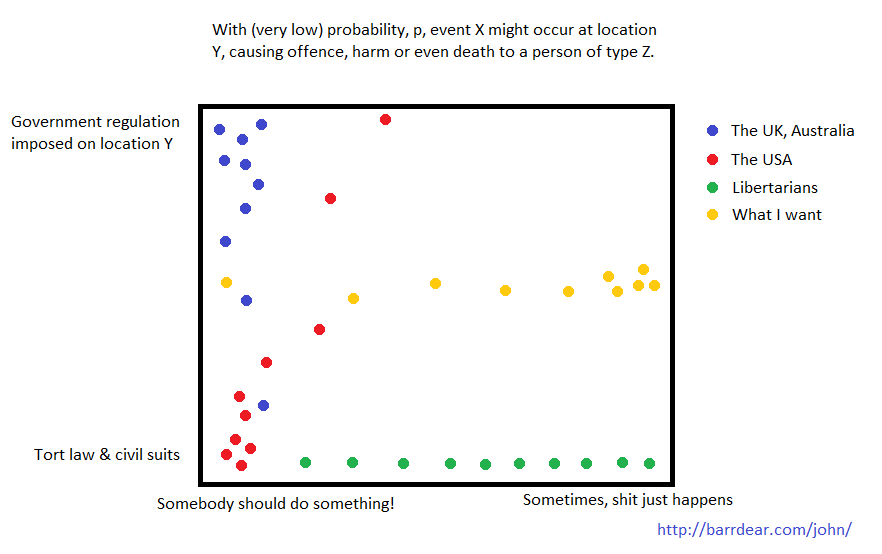In the Australian state of Queensland, a violation of traffic law is punished by a fine and the awarding of points. Points for a conviction stay on your licence for three years. If you ever have 12 points at the same time, you’re in trouble. I’ll come to that in a moment.
Somebody I know, let’s call him Semaj, has recently got himself up to 11 points. He doesn’t dispute that he broke the law for all of them; he did. Most of them came from speeding, but the last three points came from driving through a yellow light. In Queensland, just like everywhere else on the planet, you must stop at a red light; but for a yellow light, you must stop if you are safely able to do so. Some people believe that the yellow light should just be to warn drivers that the red is coming and have no penalty tied to it, but that’s not what I want to focus on. To really rub salt in the wound, the light was still yellow when Semaj left the intersection and the only other car in the area was that of the police officer that booked him. That’s what those in the business call a “dick move” by the cop, but it’s not what I want to focus on either. What I want to focus on is …
***
Perverse incentive #1
The punishment for not stopping for a yellow light when you were safely able to is the same as that for not stopping at a red light: AU$300 and 3 points. This is absurd, because it fails to make the punishment proportionate to the severity of the crime. By doing so, the government offers an incentive to people to treat them as equivalent. To illustrate the point, let me take the idea embedded here in Queensland law to a logical, but ridiculous conclusion:
The violation of all laws should be punishable by the same penalty. A serial rapist-murderer should be locked away for life. Therefore, overstaying your parking for just one minute should lead to your being locked away for life.
See? Absurd. Clearly there are gradations of severity and, just as clearly, there should be corresponding gradations of punishment. If the punishment for running a red light is a fine and 3 points, then the punishment for running a yellow should be a smaller fine and 1 point.
***
Anyway. Moving on. Semaj now has 11 points on his licence. The oldest of his points is only one year old, so he has two full years before any of them are removed. If he gets even a single point over the next two years, he will be faced with the following choice when he turns up at the Department of Transport to pay his fine:
- either give up his licence for three months;
- or go on a probationary licence (with a limit of two points instead of 12) for a full year.
After this, he will be returned a regular full licence entirely clear of points. Hopefully you can now see …
***
Perverse incentive #2
Semaj is in a position where he would be better off by breaking the law. The government is giving him an incentive to break the law. If Semaj follows the law, he will have a one-point buffer for two years, then a three-point buffer for a year before returning to a full licence. That’s three years in total. If he deliberately gets caught for a one point infraction tomorrow, he can have a two-point buffer for one year and then go immediately to a full licence. The cost to him will just be the fine for tomorrow’s infraction; maybe $100.
Who wouldn’t take that option? It’s crazy. If you’re going to have a point system with the possibility of a probationary licence, then the length of the probationary period should be long enough that someone in Semaj’s position wouldn’t actually prefer to be on it.
***
As I’ve said before, I believe that all fines issued for misdemeanours should not be for a fixed amount, but for a percentage of the transgressor’s income. When faced with the prospect of a $400 fine, somebody earning $20,000 a year will pay attention, but somebody earning $200,000 will not care nearly as much. The two people therefore face different incentives when it comes to obeying the law.
Of course, none of this comes close for the most ridiculous traffic law in Queensland. That most dubious of prizes goes to this piece of nanny-state-run-amok trash: Drivers on P-plates (that’s a “provisional” licence) “under 25 years of age can only carry one passenger under the age of 21 years who is not an immediate family member, when driving between 11pm on a day and 5am on the next day.”
For reference, the very earliest that somebody in Queensland can move from a provisional to a full licence is at the age of 20. That is two or three years into university. Most Queenslanders, if they go to university and don’t take a gap year, would turn 21 in their fourth year.
The “peer passenger restriction” of provisional licences is designed to prevent distraction (from drunk louts in the back seat) to the driver and so, presumably, lead to fewer accidents and thus fewer fatalities. Whether it ultimately succeeds in reducing road deaths is an empirical question. I don’t have access to the data, but to my mind there’s a fair possibility that we’ll actually see more road deaths from this, because …
***
Perverse incentive #3
By forcing university-age people to not share a car, the Queensland government is:
- abandoning the idea of a designated driver; and
- encouraging more traffic onto the roads at just the time of day when people are least likely to pay full attention to the road (what, did they think that those kids would stay home?).
Both of those effects will serve to push up the accident (and thus, fatality) rates.
If you want to keep drunk 20-year-olds off the roads, then give them a way to avoid them. Improve public transport. Lift the licencing restrictions on taxis.
***
Idiots.

